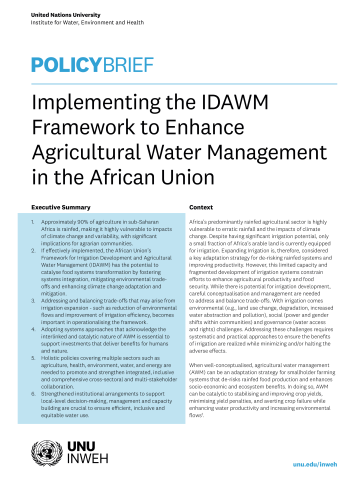T. Mabhaudhi, T.L. Dirwai, L. Nhamo, O. Cofi e, S. Jafarzadeh, K. Madani, (2025), Implementing the IDAWM Framework to Enhance Agricultural Water Management in the African Union, United Nations University Institute for Water, Environment and Health (UNU-INWEH), Richmond Hill, Ontario, Canada. doi: https://doi.org/10.53328/INR25TZM001
Download the report

Africa's predominantly rainfed agricultural sector is highly vulnerable to erratic rainfall and the impacts of climate change. Despite having significant irrigation potential, only a small fraction of Africa’s arable land is currently equipped for irrigation. Expanding Irrigation is, therefore, considered a key adaptation strategy for de-risking rainfed systems and improving productivity. However, this limited capacity and fragmented development of irrigation systems constrain efforts to enhance agricultural productivity and food security. While there is potential for irrigation development, careful conceptualisation and management are needed to address and balance trade-offs. With irrigation comes environmental (e.g., land use change, degradation, increased water abstraction and pollution), social (power and gender shifts within communities) and governance (water access and rights) challenges. Addressing these challenges requires systematic and practical approaches to ensure the benefits of irrigation are realized while minimizing and/or halting the adverse effects.
When well-conceptualised, agricultural water management (AWM) can be an adaptation strategy for smallholder farming systems that de-risks rainfed food production and enhances socio-economic and ecosystem benefits. In doing so, AWM can be catalytic to stabilising and improving crop yields, minimising yield penalties, and averting crop failure while enhancing water productivity and increasing environmental flows.
To systematically address irrigation development and AWM challenges across the continent, the African Union Commission (AUC) has developed an irrigation development and AWM (IDAWM) framework to support and coordinate evidence-based regional and national agricultural water strategies and project implementation to achieve continental food security goals.
This policy brief while encouraging irrigation expansion highlights the need for a careful consideration of the trade-offs, including the unintended consequences of irrigation efficiency improvements that have resulted in increased water use in many parts of the world.





